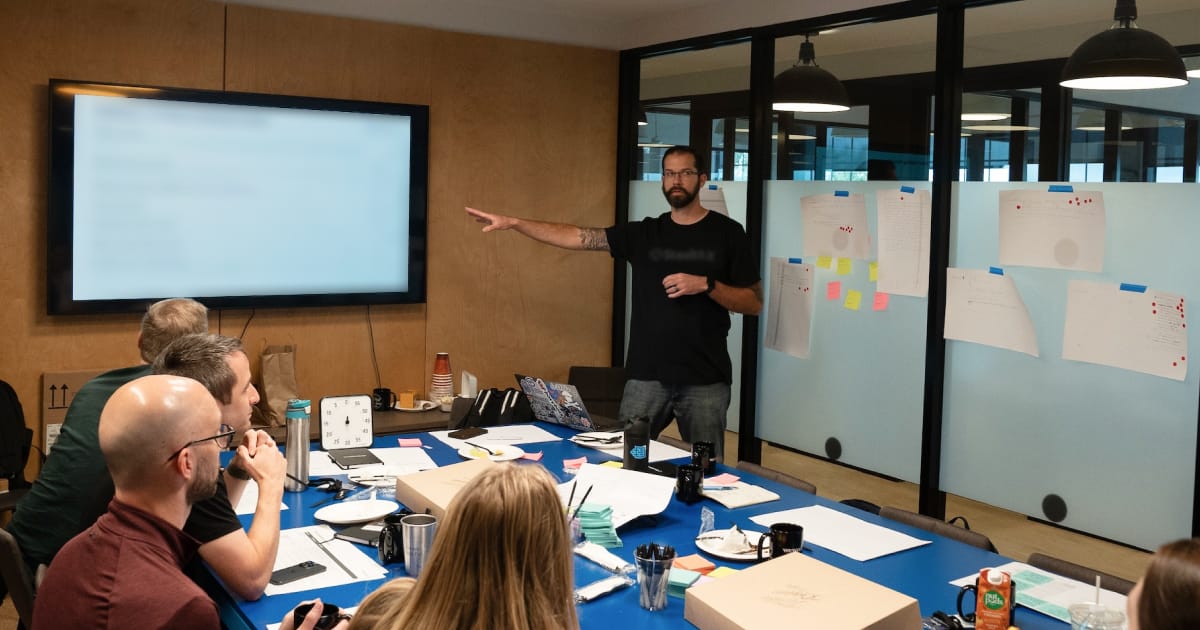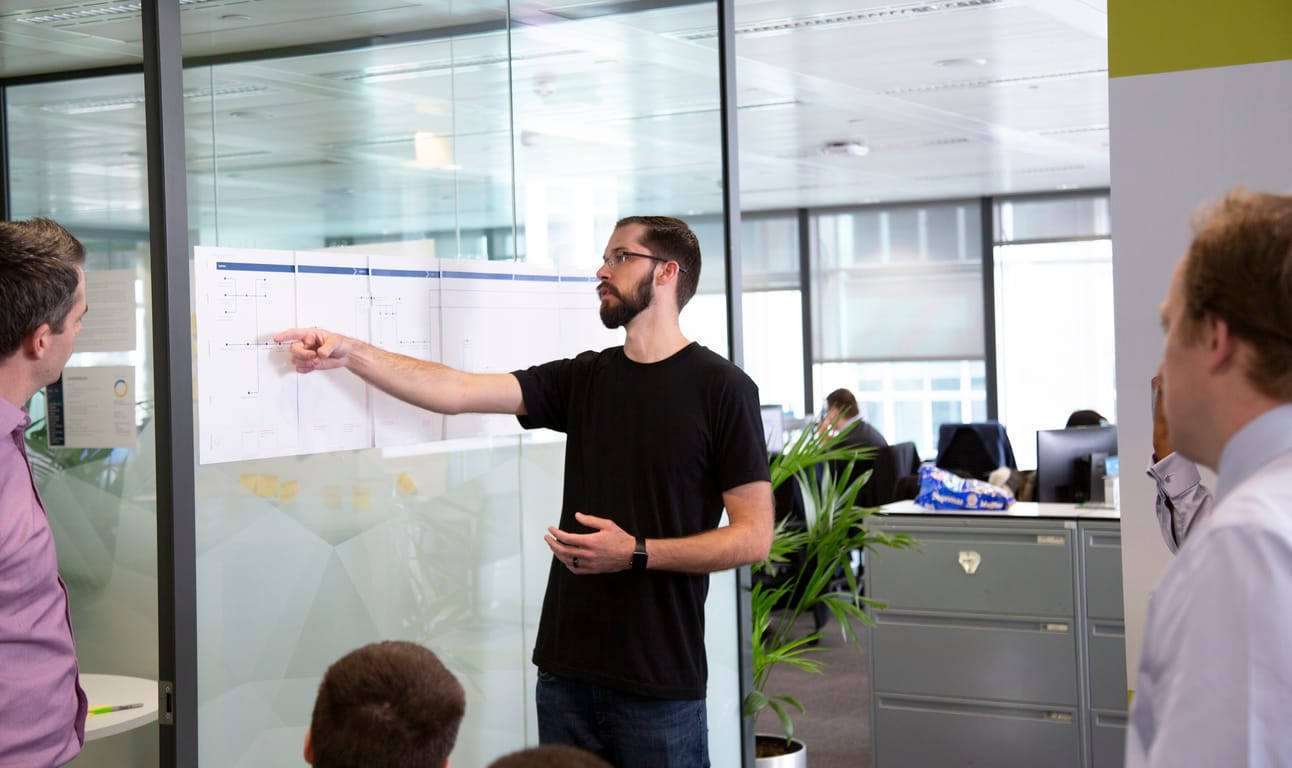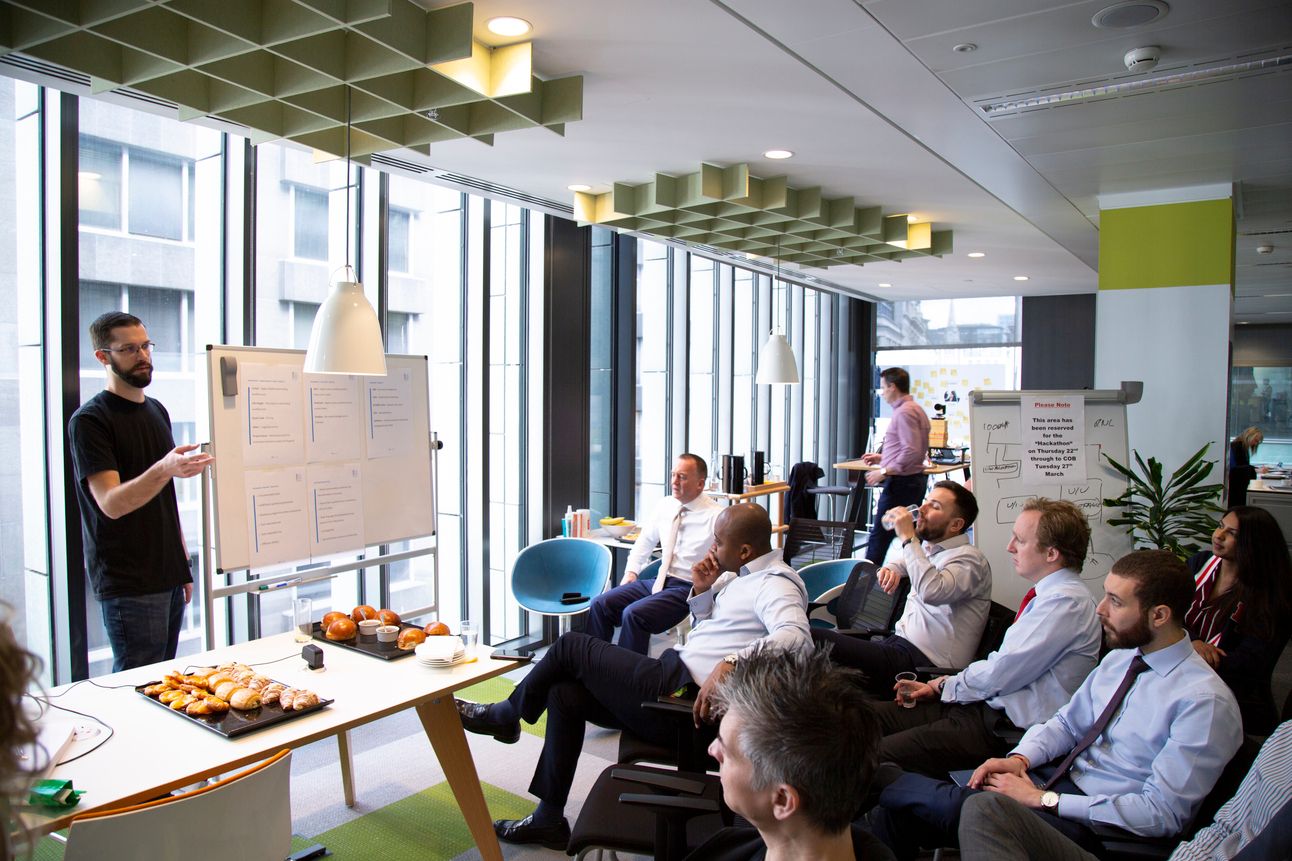
For more than a decade, I’ve facilitated dozens of workshops across various industries, working with teams of all shapes and sizes. Workshops are a super valuable tool for driving alignment, solving problems, and innovating. However, facilitating a successful workshop requires more than just organizing a meeting and throwing some post-its on the wall. I’ve learned some valuable lessons through hard knocks that can help you maximize the impact of your own workshops.
1. No workshop ever goes as planned. Facilitation is a dance, not a checklist.
You can design the perfect agenda, but things will still go off script. The best facilitators adapt, pivoting to meet the group’s needs rather than sticking rigidly to the plan. Flexibility is essential to uncover valuable insights and drive deeper engagement.
Facilitating requires emotional intelligence (EQ) to read the room, pick up on cues, and know when to steer the conversation or let it flow naturally. Often, the most valuable moments come from veering off script—but it’s just as important to guide the group back to the session’s main goals.
2. Everyone thinks their problems are unique (spoiler: they’re not)
When leaders come to me for help, they often believe the challenges they’re facing are one-of-a-kind. They think their problems are so specific or complex that they need a custom, highly specialized solution. The reality? Most problems are not that unique. The underlying issues tend to stem from common themes—unclear roles and responsibilities, a lack of guiding principles, miscommunication, or unhealthy organizational culture.
In fact, many times, it’s not the problem itself that’s causing friction, but the way the team is interacting with it. When you dig deeper, you’ll often find the real issue is personality clashes, misaligned incentives, or poor communication. Once you address these core factors, the "unique" problem starts to look a lot more manageable.
3. End with committed actions
One of the biggest reasons workshops fail to create lasting impact is that they don’t end with clear, committed actions. People leave feeling great about the ideas and discussions that took place, but without specific tasks assigned to individuals, nothing changes. Ideas fall by the wayside, and teams are left in the same place they started.
To avoid this, every workshop should end with specific, actionable commitments. Make sure individual team members are accountable for tasks, set deadlines, and follow up. This step is crucial to turning discussions into tangible progress.
4. Preparation is key
Showing up and figuring things out on the fly might work in some situations, but it won’t lead to the best outcomes in a workshop setting. I always take the time to talk to stakeholders beforehand, gather context, and understand the dynamics of the group. This prep work allows me to facilitate more effectively, having already identified potential friction points and opportunities.
When you come into a workshop with a clear understanding of the team’s challenges, goals, and dynamics, you’re able to guide the conversation toward meaningful outcomes more efficiently.
5. Off-the-shelf frameworks aren’t enough
While popular frameworks like the Google Ventures Design Sprint can be a great starting point, they rarely work perfectly as-is. In my early days, I’d try to apply these frameworks without any modifications, and the results were often underwhelming. What I’ve learned is that you need to tailor any framework to fit the team’s unique needs and culture.
As you gain more experience, you’ll develop the ability to tweak these frameworks and tools to better suit the goals of the workshop. Customization ensures you’re getting the most out of the session, rather than simply following a pre-built script.
6. Ask open-ended “magic” questions
A great facilitator knows how to ask questions that encourage participants to arrive at their own conclusions. These “magic” questions are open-ended and lead people toward solutions without you handing them the answers. When people feel like they’ve come up with the ideas themselves, they’re more likely to champion them and drive action.
This coaching principle is particularly important in workshops because it fosters ownership and commitment. If you simply tell people what to do, they’re less likely to feel connected to the decisions being made.
7. Limit the group size
The number of participants can make or break a workshop. I’ve facilitated workshops with 20 or more people, and it can quickly become chaotic and unproductive. I’ve found that keeping the group to 12-15 participants allows for better engagement and more meaningful discussions.
When the group is too large, people tend to talk over each other, or worse, not speak up at all. In smaller groups, everyone has a chance to contribute, and it’s easier to build consensus.

8. Hybrid workshops are difficult
Running a hybrid workshop—where some people are in person and others are remote—is tricky. It’s hard to create an environment where everyone feels equally involved, and often, the remote participants end up as passive observers. If possible, it’s better to go all-in on one format. Either run the workshop fully in person or fully remote, but avoid mixing the two.
When everyone is on the same playing field, you get better engagement and collaboration.
9. Set ground rules early
Setting expectations upfront is critical to running a smooth workshop. I always establish ground rules at the beginning: no phones, be present, and respect others’ time to speak. These guidelines help ensure that everyone is fully engaged and that the loudest voices don’t dominate the conversation.
Another key point is encouraging quieter participants to speak up, while asking more talkative individuals to focus on listening. Creating this balance helps generate more diverse perspectives and insights.
10. Monitor the energy of the room
Rigidly sticking to a schedule can harm the flow of the workshop. I always monitor the room’s energy to decide when it’s time for a break or when it’s better to keep pushing forward. If you notice participants getting restless or disengaged, it’s probably time to take a break or switch up the activity.
Conversely, if the group is on a roll, you don’t want to interrupt their momentum just because it’s time for a scheduled break. Flexibility in managing the energy of the room can lead to more productive and engaging sessions.

11. Snacks & meals are non-negotiable
It might seem trivial, but food is a crucial part of any successful workshop. Hungry participants are distracted participants. Providing snacks, water, and coffee keeps everyone comfortable and focused.
For multi-day workshops, I’ve found that starting with a casual dinner the night before helps build rapport and establish trust. When people arrive the next day, they already feel more connected to one another, which leads to a more collaborative and open atmosphere.
Wrapping up
Facilitating workshops is an art, requiring a balance between structure and flexibility, preparation and improvisation. By applying these lessons, I’ve been able to guide teams toward more meaningful outcomes and long-term success. Whether you’re a seasoned facilitator or just getting started, I hope these insights will help you run more effective workshops.
Onward & upward,
Drew
Interested in having me facilitate a workshop for your team or organization? Let’s talk.
For over 15 years I’ve worked with organizations of all sizes to enhance their CX and design solutions that drive business results. I’ve facilitated over 100 workshops with these organizations to define their vision, strategy, and drive alignment between stakeholders. Interested in working together? Learn more below.
